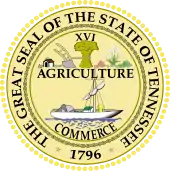Government of Tennessee
The government of Tennessee is organized under the provisions of the 1870 Constitution of Tennessee, first adopted in 1796.[1] As set forth by the state constitution, Tennessee's government is divided into three branches: executive, judicial, and legislative branches. The seat of the government in Tennessee is in its capital city of Nashville.
Executive branch
Governor
As set by the Constitution, Tennessee's governor is the Supreme Executive Power. He or she (currently Governor Bill Lee[2]) is responsible for enforcing state laws and the state constitution. He is also known as the keeper of the Great Seal of the State of Tennessee.
Lieutenant Governor
The current Lieutenant Governor is Randy McNally. He was elected on January 10, 2017 and is the second, consecutive Republican to hold the office.
Cabinet Members[3]
Lang Wiseman - Deputy to the Governor and Chief Counsel
Blake Harris - Chief of Staff in the Governor's Office
Butch Eley - Chief Operating Officer in the Governor's Office
Chris Devaney - Special Assistant to the Governor
Brandon Gibson - Senior Advisor in the Governor's Office
Chris Walker - Communications Director and Senior Advisor in the Governor's Office
Tony Niknejad - Policy Director
Charlie Hatcher - Commissioner of Agriculture
Jennifer Nichols - Commissioner of Children's Services
Julie Mix McPeak - Commissioner of Commerce & Insurance
Tony C. Parker - Commissioner of Correction
Brad Turner - Commissioner of Intellectual and Developmental Disabilities
Bob Rolfe - Commissioner of Department of Economic and Community Development
Penny Schwinn - Commissioner of Education
David Salyers - Commissioner of Environment and Conservation
Stuart McWhorter - Commissioner of Finance & Administration
Greg Gonzales - Commissioner of Financial Institutions
Christi Branscom - Commissioner of General Services
Lisa Piercey - Commissioner of Health
Juan Williams - Commissioner of Human Resources
Danielle Barnes - Commissioner of Human Services
Jeff McCord - Commissioner of Labor and Workforce
Marie Williams - Commissioner of Mental Health
Jeff Holmes - Commissioner of the Military
David Gerregano - Commissioner of Revenue
Jeff Long - Commissioner of Safety and Homeland Security
Gabe Roberts - Director of TennCare
Mark Ezell - Commissioner of Tourism
Clay Bright - Commissioner of Transportation
Courtney Rogers - Commissioner of Veterans
Legislative branch
The Tennessee General Assembly, the state legislature, consists of the 33-member Senate and the 99-member House of Representatives. Senators serve four-year terms, and House members serve two-year terms. Each chamber chooses its own speaker, e.g., the Lieutenant Governor and Speaker of the Senate of Tennessee is elected by the Senate from among its members. Constitutional officials in the legislative branch are elected by a joint session of the legislature.
Judicial branch
Supreme Court[4]
The Supreme Court of Tennessee is known as the “Court of Last Resort.” It composed of a chief justice (currently Jeffrey S. Bivins) and four associate justices (currently Holly Kirby, Cornelia Clark, Sharon Lee, and Roger Page). No more than two justices can be from the same Grand Division. As required by the Tennessee Constitution, the Supreme Court regularly meets in Jackson, Knoxville, and Nashville. In addition to the regular meetings of the Supreme Court, the Court takes their oral arguments on the road as part of the SCALES program (Supreme Court Advancing Legal Education for Students) a few times each year.
The Supreme Court of Tennessee also appoints the Attorney General (currently Herbert Slatery III), a practice that is not found in any of the other 49 states in the Union. The Attorney General of Tennessee is the chief legal officer of the state, and "represents state officers and agencies through his staff of approximately 340 employees working in five offices across Tennessee".[5]
Intermediate Appellate Courts
The intermediate appellate courts of Tennessee include the court of appeals and the court of criminal appeals. The court of appeals hears cases appealed from probate, chancery, and circuit courts, whereas the court of criminal appeals hears cases appealed from circuit and criminal courts.
Both the Court of Appeals and the Court of Criminal Appeals have 12 judges.
Trial Courts
Trial courts in the state of Tennessee include probate courts, chancery courts, circuit courts, and criminal courts. The circuit courts, chancery and probate courts, and criminal courts each have 31 judicial districts.
Courts of Limited Jurisdiction
The courts of limited jurisdiction include juvenile courts, general sessions courts, and municipal courts.
See also
- Tennessee State Capitol in Nashville
External links
References
- "Tennessee State Constitution | Tennessee Secretary of State". sos.tn.gov. Retrieved 2019-04-02.
- "About Bill Lee". www.tn.gov. Retrieved 2019-04-02.
- "Cabinet". www.tn.gov. Retrieved 2019-04-02.
- "Supreme Court | Tennessee Administrative Office of the Courts". www.tncourts.gov. Retrieved 2019-04-02.
- "Attorney General Slatery". www.tn.gov. Retrieved 2019-04-02.
